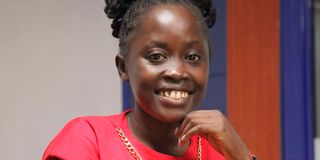Breaking News: At least 10 feared to have drowned in Makueni river
I’m determined to end sickle cell stigma

What you need to know:
- Jesca has since completed her diploma in social work and community development at Kisumu National Polytechnic, and proceeded for her degree in Development and Strategic Studies.
- She hopes to graduate in February 2022 at Maseno University. Despite the milestones, Sharon still decries the stigma related to sickle cell disease.
- She says that as a child, the weird stares and looks would easily pass unnoticed. However, she became more aware of herself when she grew older, and the stigma became more noticeable.
“It’s not the pain that kills you, it is the stigma and discrimination from those around you,” points out 29-year-old Sharon Jesca Awuor. Diagnosed with sickle cell disease at three-months, Jesca says she has suffered greatly due to society’s long held myths and misconceptions regarding the disease.
“There is stigma around sickle cell, so much that parents have been made to believe that the genetic disorder cannot allow their children to see their 18th birthday,” said the sickle cell disease anti-stigma crusader.
“I have friends who are nearly 40 years old and are impacting their communities in many ways despite having sickle cell," she shares.
Sharon, the first born in a family of five children, says that for nearly three decades, her journey with sickle cell has been a rough one. Her studies were constantly interrupted by lengthy hospital stays.
“I would miss vital school days, including exams. I would stay for long in hospitals and sometimes home as doctors tried to manage the disease,” she recalls. She however found a great support system in her family. Her parents and siblings always held her hand through the difficult and sometimes lonely moments. Born to parents who are both teachers, Jesca was given the best education. Her mum and dad were her biggest supporters.
“I was so disappointed at my grades after high school, but oddly, my parents were so proud of me and urged me on,” she remembers.
Jesca has since completed her diploma in social work and community development at Kisumu National Polytechnic, and proceeded for her degree in Development and Strategic Studies. She hopes to graduate in February 2022 at Maseno University.
Despite the milestones, Sharon still decries the stigma related to sickle cell disease. She says that as a child, the weird stares and looks would easily pass unnoticed. However, she became more aware of herself when she grew older, and the stigma became more noticeable.
“The stigma peaked in my adult life, while in college,” she says of her time in Kisumu Polytechnic back in 2018. “I felt inspired to stand up for the many people living with sickle cell disease by creating awareness among students. She admits that what motivated her even more was her studies, as they involved community work.
“After college, I got lost in the hustle of job hunting until a friend, Brenda Syovata, who conducts charity campaigns and donations in Nairobi, asked me if I could assist in an outreach programme in Kisumu.”
Jesca helped deliver the sanitary donations in a simple but colourful event at a children's home. It was meant to be a one-time event, but the online buzz when she posted the pictures from the event on her social media pages got her wishing she could do more community work.
Friends offered to support the noble idea and she was soon immersed in the programme, rolling out donation activities. She named this project the Ultra Wings Initiative.
Later, in December 2019, due to her exemplary community work, Jesca applied and got admitted into a project management fellowship at Akili Dada, a young woman empowerment organisation.
She juggled her studies and the one-year fellowship and in 2020, she graduated after acquiring immense knowledge. Armed with funding from Akili Dada, Jesca rebranded her organisation to fit into her newly acquired leadership and mentorship skills, supportive networks, personal and professional development.
“We acquired a new name, Peperusha Binti, with our renewed spirit to work in the community. That year, we had more outreach activities than ever before,” she recalls.
She admits that before then, much focus on sickle cell disease, including by government agencies, had been centred on Nairobi. As such, Kisumu, her new base of operations, was lacking in awareness drives.
Because of this, she focused on collaborating with organisations and hospitals that were already into sickle cell advocacy, and joined them in calling for proper care and early screening.
They conducted hospital and community visits where they demystified myths around sickle cell anaemia.
The deeply entrenched notion that the disease is akin to a death sentence has been their biggest challenge. Sharon hopes that parents and caregivers would understand that with proper care and regular hospital check-ups, the disease can be successfully managed.
She also admits that access to proper medical care has been another of their obstacles, since medication as expensive and out of reach for poor families.
"It takes between Sh3,000- Sh5,000 a month to put a patient on medication and that is beyond the reach of most vulnerable families,” she says.
Jesca has since come up with a fundraiser programme dubbed ‘Coffee for Champions’, to support vulnerable families. The programme in its second cycle has so far supported 15 families. Sharon hopes to help more families afford the medication for sickle cell disease.
She also continues to work with adolescents and young women on creating awareness on issues around menstrual hygiene and sexual reproductive health with an aim of ending gender-based violence in the informal settlements in Kisumu.





